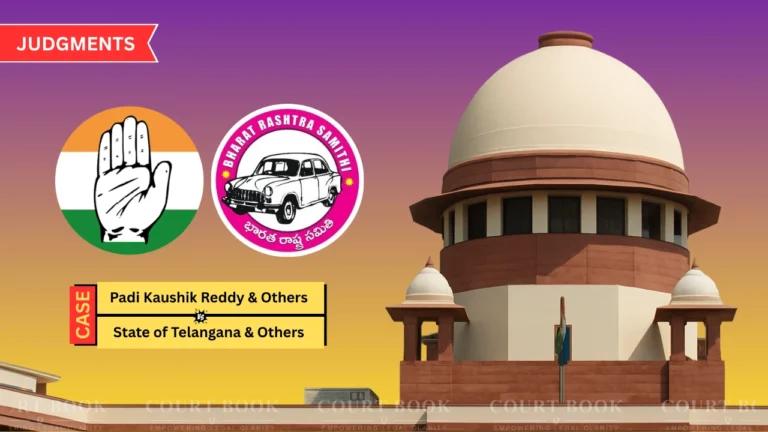The Supreme Court, in Padi Kaushik Reddy & Ors. v. State of Telangana & Ors., clarified a vital constitutional issue regarding the Speaker's role in deciding disqualification petitions under the Tenth Schedule. The case arose from the delayed decisions on disqualification petitions filed against MLAs who had allegedly defected from Bharat Rashtra Samithi (BRS) to the Indian National Congress (INC) after the 2023 Telangana Assembly elections.
Background of the Case
Following the Telangana elections in November 2023, three MLAs from BRS — Danam Nagender, Venkata Rao Tellam, and Kadiyam Srihari — won their seats. Allegedly, all three defected to INC in early 2024. Petitions seeking their disqualification were filed by fellow MLAs from BRS and BJP under Paragraph 2(1) of the Tenth Schedule.
Read also:- Supreme Court Rules: Commuting Accidents Covered Under Employment Compensation – Key Legal Insights
Due to inaction from the Speaker, the petitioners approached the Telangana High Court. A Single Judge directed the Assembly Secretary to place the disqualification petitions before the Speaker within four weeks. However, this order was later overturned by the Division Bench of the High Court, prompting an appeal to the Supreme Court.
Can the judiciary direct the Speaker to decide disqualification petitions within a fixed time frame?
Chief Justice B.R. Gavai, delivering the judgment, upheld the High Court’s Division Bench ruling and emphasized that:
“Judicial review cannot be available at a stage prior to the decision by the Speaker... Quia timet actions are not permissible.”
Read also:- SC Dismisses Review Plea in Harkaish Bhadoria vs Union of India Case
The Court held that while disqualification matters fall under the judicial scrutiny post-decision, no court can impose timelines on the Speaker for deciding such petitions.
- The Speaker acts as a tribunal under Paragraph 6(1) of the Tenth Schedule and their decisions are subject to judicial review for jurisdictional errors like malafide intent or breach of natural justice.
- Citing Kihoto Hollohan v. Zachillhu, Rajendra Singh Rana, and Subhash Desai, the Court reiterated that judicial review before the Speaker’s decision is not allowed except in extreme situations.
- The Court also distinguished the precedent of Keisham Meghachandra Singh, stating it was wrongly relied upon and does not constitute binding law on issuing fixed timelines to the Speaker.
“If a disqualification petition is not decided due to prolonged inaction by the Speaker, that may be regrettable, but it does not empower the Court to intervene preemptively.”
Read also:- SC Adjourns CPIL’s Plea Against Centre; Next Hearing on August 5
This verdict reinforces the constitutional sanctity of the Speaker's role while affirming that judicial review is available only after a decision is made — not before. While delays are undesirable, courts cannot compel a timeline, maintaining the delicate balance of powers between the legislature and judiciary.
Case Title: Padi Kaushik Reddy & Others v. State of Telangana & Others
Judgment Date: 26 July 2024
Citation: Civil Appeal Nos. 4865-4866 of 2024














